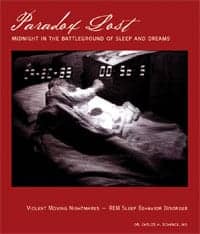By Markus H. Schmidt, MD, PhD
Paradox Lost: Midnight in the Battleground of Sleep and Dreams is a compilation of narratives and patient interviews meticulously gathered by Carlos Schenck, MD, stemming from more than two decades of work by Schenck and colleagues researching patients with parasomnias. The repertoire presented in this book of abnormal and unwanted behaviors occurring during sleep is truly remarkable. The reader will appreciate the potential hazards and dangers to both patients and bed partners as these often bizarre behaviors during sleep become manifest, such as patients jumping out of windows or strangling or hitting their bed partners while asleep. The book also highlights the psychological distress many patients face when trying to remedy their behavior given the lack of awareness of parasomnias in the general medical community and a tendency to consider such patients as simply psychologically disturbed.
The title Paradox Lost is a reference to Michel Jouvet’s description of rapid eye movement (REM) sleep, which he coined “paradoxical sleep.” The “paradox” is the appearance of brain activation and dreaming while the body is paralyzed and asleep. The loss of this paralysis in REM sleep allows for the expression of abnormal behaviors or dreams in REM sleep, such as in REM sleep behavior disorder (RBD).
Although the title implies the book may emphasize RBD, it includes much more than that. This work covers a wide range of non-REM sleep parasomnias, including night terrors, sleep walking, sleep eating behavior, and sleep sex behaviors. Other parasomnias, such as nocturnal dissociative disorder, and medicolegal issues also are presented. The early chapters review sleep and wakefulness, as well as an overview of the parasomnias. The parasomnias are then presented in subsequent chapters, each containing numerous interviews between Schenck and his patients. Each interview is prefaced with a summary of the patient’s findings and pertinent comments from Schenck.
The sheer volume of patient interviews and stories spanning the various parasomnias is a remarkable achievement. Paradox Lost is written for a wide audience, and all who read it, from patient to technician to sleep medicine specialist, will be enriched from the experience of Schenck and his colleagues.
Markus H. Schmidt, MD, PhD, is director of research at the Ohio Sleep Medicine and Neuroscience Institute Inc, Dublin, and serves as adjunct assistant professor at Ohio State University in the Department of Neuroscience.





